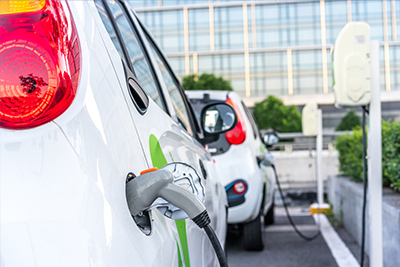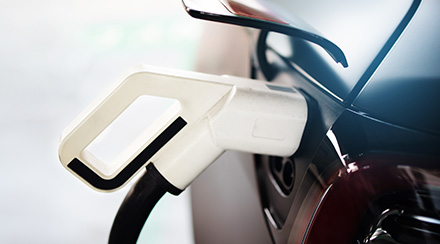Electric Car Maintenance: How to Maintain Your Electric Vehicle

Making the switch from a gas-powered vehicle to an electric vehicle (EV) obviously means fewer trips to the gas station, but it usually means fewer trips to the mechanic, too.
EVs are significantly different in design from combustion engine vehicles, with fewer moving parts, fluids and hoses. They’re not maintenance-free, but the simplicity of EV maintenance can help you save both time and money.
Maintenance Costs of Electric Cars vs. Gas Cars
With gas-powered cars, the need to frequently change the engine oil is a routine chore that many drivers don’t feel comfortable doing themselves, which means multiple service appointments per year. But electric cars don’t use oil or need oil changes, nor do they require transmission service or tune-ups. There are no engine air filters, spark plugs or drive belts to replace, either. Many of the most common maintenance tasks that send gas-powered cars back to the mechanic simply don’t apply to EVs.
On the other hand, electric cars have massive batteries, electric motors and regenerative braking systems, unlike gas-powered cars. These components typically require little to no maintenance over the lifetime of an electric car, but if they do require repair or replacement that isn’t covered by a warranty, the costs may be higher than those of most gas-powered car repairs.
Electric Car Maintenance Factors

There are a few ways in which maintaining an electric car is similar to gas-powered car maintenance:
- Tires. The tires on electric cars are just as vulnerable to tread wear, low PSI levels and punctures as gas-powered vehicle tires. Check and top off your tire pressure regularly, and rotate and replace your tires per their maintenance schedule or when they wear out.
- Windshield wipers and wiper fluid. Windshield wipers should be inspected regularly and replaced whenever they show signs of cracking or tearing. Windshield washer fluid must be topped off as needed.
- Coolant. In gas-powered vehicles, coolant fluid is used to absorb heat from the engine. But in EVs, coolant is circulated through a loop that cools the battery and several of the electronic components. Different EVs will have different maintenance schedules for flushing and replacing coolant, but it’s always important to periodically check the coolant level, as low levels may indicate a leak and could endanger the battery.
- Brakes. Electric cars use a technology called regenerative braking to decelerate without the use of traditional resistance brakes, but all electric cars still have resistance brakes installed. Regenerative braking means that brakes on an electric car will wear out much slower, but they may still require brake fluid or fresh brake pads over the life of the vehicle.
- Struts. The gas struts on EVs – both for the suspension of the vehicle and for trunk lids and hatches – are the same as the struts on gas-powered cars. They can wear out over time or even break, requiring replacement.
- Cabin air filters. These should be replaced per the carmaker’s recommended schedule to keep the air inside the car smelling fresh.
- Air conditioner maintenance. As with gas-powered vehicles, the air conditioner in an EV may occasionally need a refrigerant recharge or replacement of desiccant filters.
- Washing. Like any car, EVs should be cleaned inside and out as needed to maintain their finish and appearance. If you drive in an area where road salt is used, you should have the undercarriage washed periodically, especially in the winter.
What About the Battery?

In most cases, EV batteries require no maintenance and are designed to last for the life of the vehicle. Gradual loss of overall battery capacity is normal, however, and could significantly reduce the maximum mileage range of an EV after many years of service.
To help minimize wear and tear on the battery, there are a few things EV drivers can do:
- Avoid fully depleting or fully charging the battery. In general, drivers should try to keep the battery level between 10 and 90 percent to help extend its life. Many models have settings that automatically prevent charging the battery to full capacity.
- Avoid charging the battery when the battery itself is under extreme temperatures. Charging a battery when it is very cold or hot can cause damage. To avoid this, it is often helpful to charge the battery immediately after the car has been driven for some distance. In cold temperatures, running the battery will warm it up, and in hot temperatures, driving the car will circulate coolant through the battery, cooling it down.
- Avoid using fast chargers, also called level 3 chargers. While these can be convenient for their ability to fully charge an EV battery quickly, using them taxes the battery. Try to use these only when fast charging is absolutely necessary.
EV Warranties
With EVs, looking into the warranty is more important than ever. Many drivers look for a solid manufacturer’s warranty when shopping for a new car because it allows them to drive with peace of mind. If a component fails prematurely and within the warranty period, there is usually little or no cost for repairs or replacement. And because EVs are simpler than gas-powered vehicles and tend to have fewer repair issues, EV warranties are usually much more generous. When it comes to warranties on EV batteries, for example, it’s not uncommon to see warranties offered for 10 years or 150,000 miles, whichever comes first.
Because these warranties are longer in duration and cover more expensive parts, it’s especially important to comply with the terms of an EV warranty. This often means taking the EV to a dealership for maintenance and inspections on a prescribed schedule. If you fail to do this within the required timeframe, part or all of the manufacturer’s warranty may be voided. So if you make the switch to an EV, be sure to read the warranty terms carefully and comply with all manufacturer requirements.
Not sure if an electric car is right for you? Take the time to investigate the major cost factors to see how they’ll pan out for you, as well as other costs that may not be so obvious. But the decision should involve more than just cost. Check out our article about electric car pros and cons.
Looking for Something Specific?
Select a category to find resources for topics that interest you.
Select Category

Related Articles:

Are Electric Cars Better for the Environment?
Electric cars produce virtually zero emissions while they’re being driven, but charging car batteries and the materials used to make these batteries have their own environmental impact. See how these effects balance out.
Read Article
Are Electric Cars Worth It?
Electric cars are becoming more popular among consumers and car makers for their impressive technology and positive environmental impact. When deciding whether an electric car is right for you, consider these benefits as well as the trade-offs.
Read Article
Are Electric Cars Cheaper in the Long Run?
The popularity of electric cars is growing as manufacturers introduce affordable models that can drive farther on a single charge. While great for the environment, are they great for your wallet?
Read ArticleMost Popular Articles

Electric Vehicle Guide
Whether you're deciding if an EV is right for you or setting up a home charger, our Electric Vehicle Guide can help you wherever you are in your EV journey. Learn More.
Electric Car Maintenance: How to Maintain Your Electric Vehicle
Making the switch from a gas-powered vehicle to an electric vehicle (EV) obviously means fewer trips to the gas station, but it usually means fewer trips to the mechanic, too.
EVs are significantly different in design from combustion engine vehicles, with fewer moving parts, fluids and hoses. They’re not maintenance-free, but the simplicity of EV maintenance can help you save both time and money.
Maintenance Costs of Electric Cars vs. Gas Cars
With gas-powered cars, the need to frequently change the engine oil is a routine chore that many drivers don’t feel comfortable doing themselves, which means multiple service appointments per year. But electric cars don’t use oil or need oil changes, nor do they require transmission service or tune-ups. There are no engine air filters, spark plugs or drive belts to replace, either. Many of the most common maintenance tasks that send gas-powered cars back to the mechanic simply don’t apply to EVs.
On the other hand, electric cars have massive batteries, electric motors and regenerative braking systems, unlike gas-powered cars. These components typically require little to no maintenance over the lifetime of an electric car, but if they do require repair or replacement that isn’t covered by a warranty, the costs may be higher than those of most gas-powered car repairs.
Electric Car Maintenance Factors
There are a few ways in which maintaining an electric car is similar to gas-powered car maintenance:
- Tires. The tires on electric cars are just as vulnerable to tread wear, low PSI levels and punctures as gas-powered vehicle tires. Check and top off your tire pressure regularly, and rotate and replace your tires per their maintenance schedule or when they wear out.
- Windshield wipers and wiper fluid. Windshield wipers should be inspected regularly and replaced whenever they show signs of cracking or tearing. Windshield washer fluid must be topped off as needed.
- Coolant. In gas-powered vehicles, coolant fluid is used to absorb heat from the engine. But in EVs, coolant is circulated through a loop that cools the battery and several of the electronic components. Different EVs will have different maintenance schedules for flushing and replacing coolant, but it’s always important to periodically check the coolant level, as low levels may indicate a leak and could endanger the battery.
- Brakes. Electric cars use a technology called regenerative braking to decelerate without the use of traditional resistance brakes, but all electric cars still have resistance brakes installed. Regenerative braking means that brakes on an electric car will wear out much slower, but they may still require brake fluid or fresh brake pads over the life of the vehicle.
- Struts. The gas struts on EVs – both for the suspension of the vehicle and for trunk lids and hatches – are the same as the struts on gas-powered cars. They can wear out over time or even break, requiring replacement.
- Cabin air filters. These should be replaced per the carmaker’s recommended schedule to keep the air inside the car smelling fresh.
- Air conditioner maintenance. As with gas-powered vehicles, the air conditioner in an EV may occasionally need a refrigerant recharge or replacement of desiccant filters.
- Washing. Like any car, EVs should be cleaned inside and out as needed to maintain their finish and appearance. If you drive in an area where road salt is used, you should have the undercarriage washed periodically, especially in the winter.
What About the Battery?
In most cases, EV batteries require no maintenance and are designed to last for the life of the vehicle. Gradual loss of overall battery capacity is normal, however, and could significantly reduce the maximum mileage range of an EV after many years of service.
To help minimize wear and tear on the battery, there are a few things EV drivers can do:
- Avoid fully depleting or fully charging the battery. In general, drivers should try to keep the battery level between 10 and 90 percent to help extend its life. Many models have settings that automatically prevent charging the battery to full capacity.
- Avoid charging the battery when the battery itself is under extreme temperatures. Charging a battery when it is very cold or hot can cause damage. To avoid this, it is often helpful to charge the battery immediately after the car has been driven for some distance. In cold temperatures, running the battery will warm it up, and in hot temperatures, driving the car will circulate coolant through the battery, cooling it down.
- Avoid using fast chargers, also called level 3 chargers. While these can be convenient for their ability to fully charge an EV battery quickly, using them taxes the battery. Try to use these only when fast charging is absolutely necessary.
EV Warranties
With EVs, looking into the warranty is more important than ever. Many drivers look for a solid manufacturer’s warranty when shopping for a new car because it allows them to drive with peace of mind. If a component fails prematurely and within the warranty period, there is usually little or no cost for repairs or replacement. And because EVs are simpler than gas-powered vehicles and tend to have fewer repair issues, EV warranties are usually much more generous. When it comes to warranties on EV batteries, for example, it’s not uncommon to see warranties offered for 10 years or 150,000 miles, whichever comes first.
Because these warranties are longer in duration and cover more expensive parts, it’s especially important to comply with the terms of an EV warranty. This often means taking the EV to a dealership for maintenance and inspections on a prescribed schedule. If you fail to do this within the required timeframe, part or all of the manufacturer’s warranty may be voided. So if you make the switch to an EV, be sure to read the warranty terms carefully and comply with all manufacturer requirements.
Not sure if an electric car is right for you? Take the time to investigate the major cost factors to see how they’ll pan out for you, as well as other costs that may not be so obvious. But the decision should involve more than just cost. Check out our article about electric car pros and cons.
Looking for Something Specific?
Select a category to find resources for topics that interest you.
Select Category

Related Articles:

Are Electric Cars Better for the Environment?
Electric cars produce virtually zero emissions while they’re being driven, but charging car batteries and the materials used to make these batteries have their own environmental impact. See how these effects balance out.
Read Article
Are Electric Cars Worth It?
Electric cars are becoming more popular among consumers and car makers for their impressive technology and positive environmental impact. When deciding whether an electric car is right for you, consider these benefits as well as the trade-offs.
Read Article
Are Electric Cars Cheaper in the Long Run?
The popularity of electric cars is growing as manufacturers introduce affordable models that can drive farther on a single charge. While great for the environment, are they great for your wallet?
Read ArticleMost Popular Articles

Electric Vehicle Guide
Whether you're deciding if an EV is right for you or setting up a home charger, our Electric Vehicle Guide can help you wherever you are in your EV journey. Learn More.







